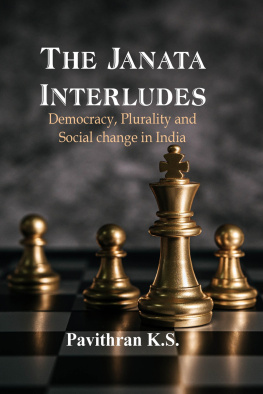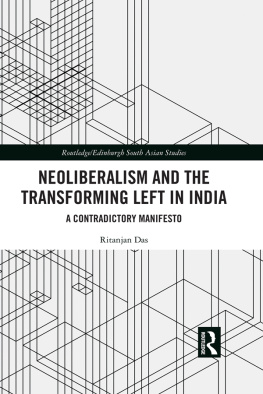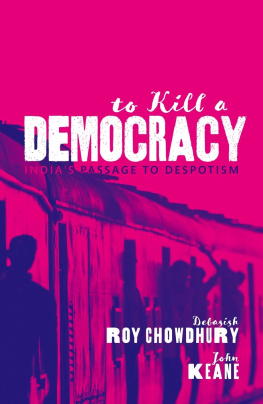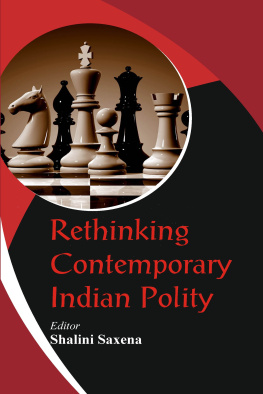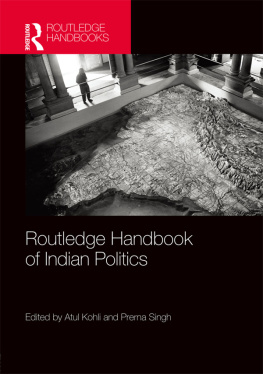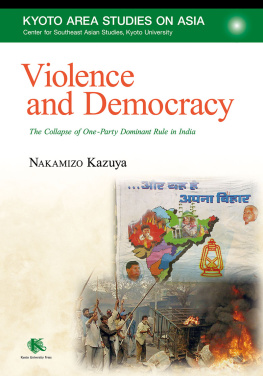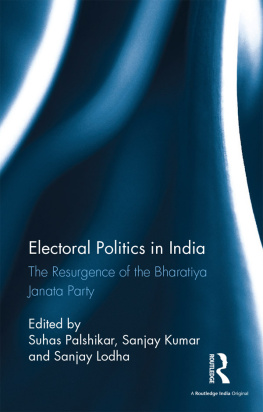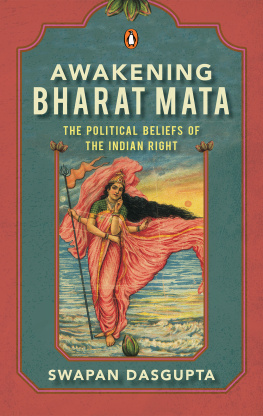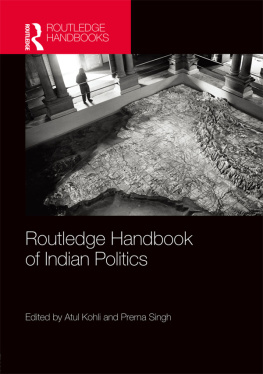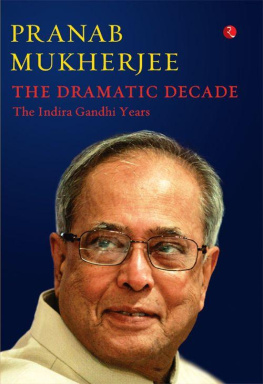Published by
Vij Books India Pvt Ltd
(Publishers, Distributors & Importers)
2/19, Ansari Road
Delhi 110 002
Phones: 91-11-43596460, 91-11-47340674
Mobile: 98110 94883
e-mail:
www.vijbooks.com
Copyright 2020, Author
ISBN: 978-93-89620-17-7 (HB)
ISBN: 978-93-89620-18-4 (ebook)
Price in India: 595/-
All rights reserved.
No part of this book may be reproduced, stored in a retrieval system,
transmitted or utilised in any form or by any means, electronic,
mechanical, photocopying, recording or otherwise, without the prior
permission of the copyright owner. Application for such permission
should be addressed to the publisher.
Over the years I did research on the topic of this book and my teachers and friends have provided invaluable encouragement and assistance. I would like to keep in memory the inspiration given by late Dr. R. Ramakrishnan Nair, formerly Professor and Head of the Department of Politics, University of Kerala to take up post-emergency politics as an apt topic for analysis.
I would also like to thank in particular Dr. N.K. Bhaskaran, Professor and Former Head of the Department of Politics, University of Kerala for his enlightening suggestions through out the completion of this work.
Thanks are also to Dr. C. N. Somarajn, Shri. A.M. Roshan and Dr. V. Rajendran Nair who helped me through inspiring discussions and fruitful comments on the draft, and to Srilatha who offered routine forms of support and assisted him with great patience.
Lastly I am obliged to Vij Books, New Delhi for undertaking the publication of the book.
- Pavithran K.S.
Every nation arrives at a crossroad, when the existing regime become oppressive and people start looking for an alternative. At this juncture they abandon the uneasy security of a longstanding governing system and opt for the risky experiment of a new political combination. This, the Indian people did in 1977 and again in 1989. These two political experiments were eventful periods in the history of Indian democracy. An evaluative and comparative analysis of these Janata experiments is of great interest to the students of democracy and Indian politics throughout the world.
The largest democracy in the world, which combined miserable poverty and a developing economy, was suspected by many to be an infertile soil for the seeds of democracy. However, the Indian political system succeeded in coping with the pressures and pulls under the statesmanship and charisma of Jawaharlal Nehru with the moral support of the Gandhian and Nationalistic legacy. But by 1975 the compulsions of social forces and the state of the economy prompted Indira Gandhi to declare a state of Emergency, which the Indian people felt oppressive and threatening. Many of her critics alleged that Mrs. Gandhi had resorted to such drastic measures with the objective of sustaining her dynastic dictatorship. The backlash of this regime and the politics after the historic Lok Sabha elections of March 1977, are of utmost importance to historians and students of Indian politics as well as progressive minded people. The subsequent journey of the new experiment from total revolution to total disintegration proved indeed, that Indian faction politics is in general, a question not of principles, but of persons.
a political entity with fluctuating fortunes in the future of the country. The Emergency experience proved to be a moment of truth for many in the Left and has led to the realisation that a democratic revolution was a necessary precondition for a true peoples revolution. However, the general contour lines of these developments could be discerned in the light of the political upheavals and turbulence of the following decades. The solutions could be found deeper down the crevices of the Indian body politic, factious cliques and is left to the caprices of posterity.
The November 1989 Lok Sabha elections and the formation of the minority National Front Government with the support from outside by the two polar opposites the Bharatiya Janata Party and the Left Front are novel experiments in the Indian political scenario. The collapse of the V.P. Singh government in its fight against casteism and communalism, along with the Left and other progressive elements, visibly headed towards political polarisation and re-alignment of all secular and democratic forces in the country.
The study of a changing political system and new political experiments is always an absorbing vocation to students of political science. Instead of dwelling on the political actions of the past, it is more relevant to apply the standards of evaluation they have developed to contemporary problems. When I started my post graduate studies in 1979, the Janata experiment was at its peak. The first sensations of Janata upheaval was before this and the emergence of disillusionment was slowly visible in the horizon. Closely following these events to the present-day political developments, it is natural for me to take it as an interesting topic for analysis and hence this study.
The general outline of the study is divided into nine chapters. The first is the general introduction, following by seven chapters dealing with particular studies of situations and tendencies of importance. Thus, the chapter on Back-lash of Emergency deals with the pre-emergency situation and postulates that there existed, a definite political tendency which may be termed as a break-down of democracy. The origins of such a tendency are sought in the then prevailing socio-economic structures and the whole study is conducted within a historical frame of reference. The study extends to the formation of the Janata Party as a viable alternative.
Unlike the other chapters the third chapter is relatively autonomous and consists mainly of information on the March 1977 elections to the Parliament. The impact of the election on the Indian Political System is also discussed. The fourth chapter is the direct extension of the third and treats post-poll political processes with a special reference to the formation of the Janata Government and developments within the Congress Party.
The fifth chapter is on the promises and performance of the Janata government. It also deals with the failure and disintegration of Janata experiment which may bear the tone of an indictment. The following two chapters are provided with the political developments in India - the 1989 Lok Sabha elections, the formation of the new coalition and the National Front government and the collapse of it due to the inner contradictions of its support-base and the signs of political modernization and development are critically and analytically examined.
The eighth chapter is an analysis of the Indian socio-historic structure with the specific aim of determining why and how it has not been conducive to the emergence of a strong Left-oriented political party. It also treats the efforts made towards the formation of a Left Front comprising the various communist, socialist and other anti-communal and anti-authoritarian forces. The conclusion, is devoted to surmises and conclusions warranted by the foregoing study. It deals with the possibilities of subjecting the facts presented in the earlier chapters to a political analysis and a drawing of logically permissible conclusions.

